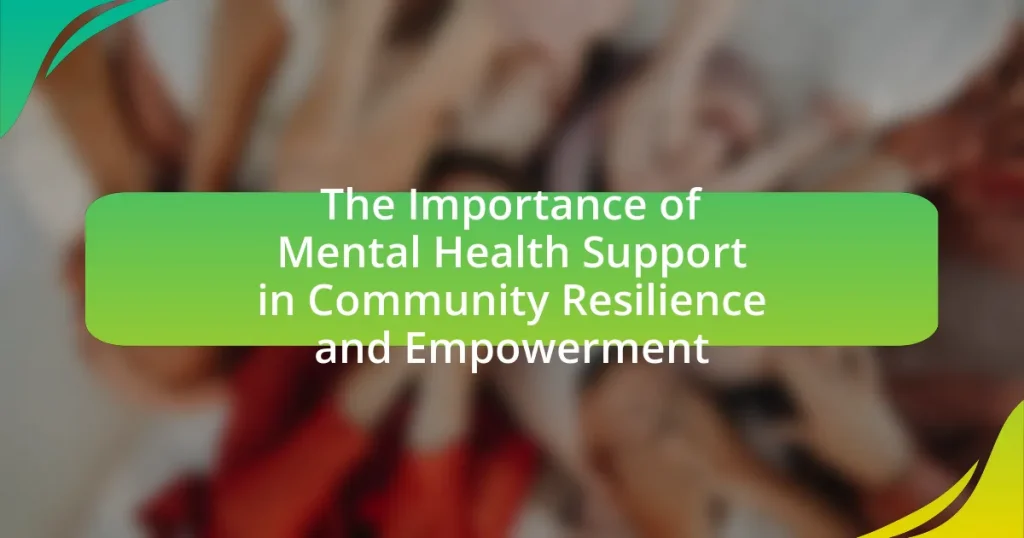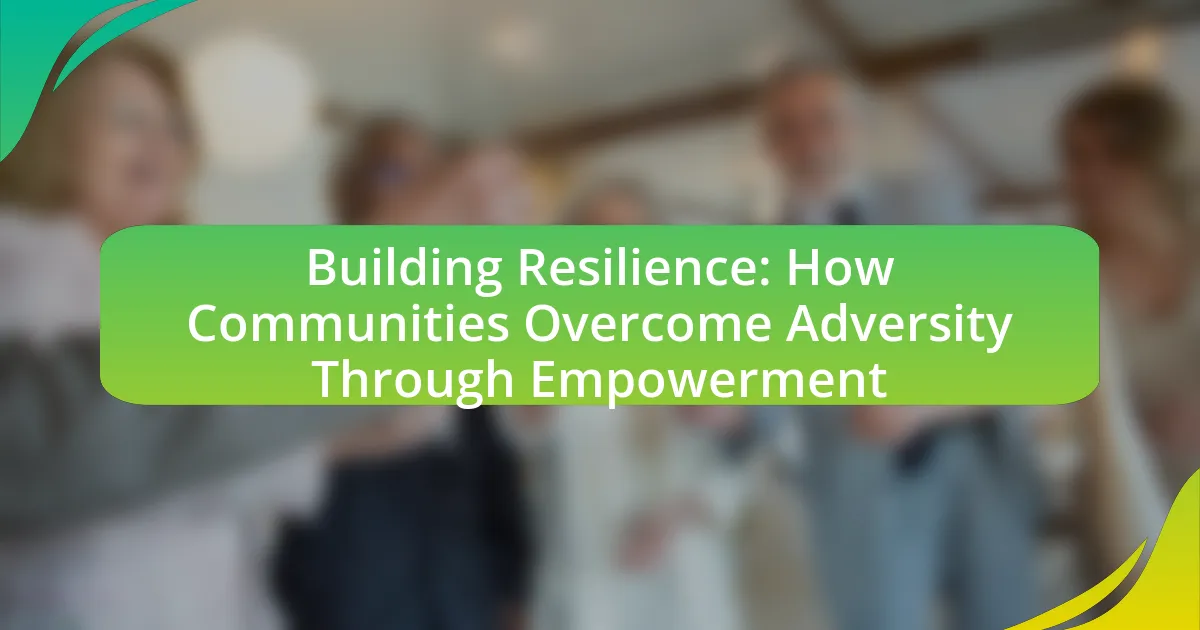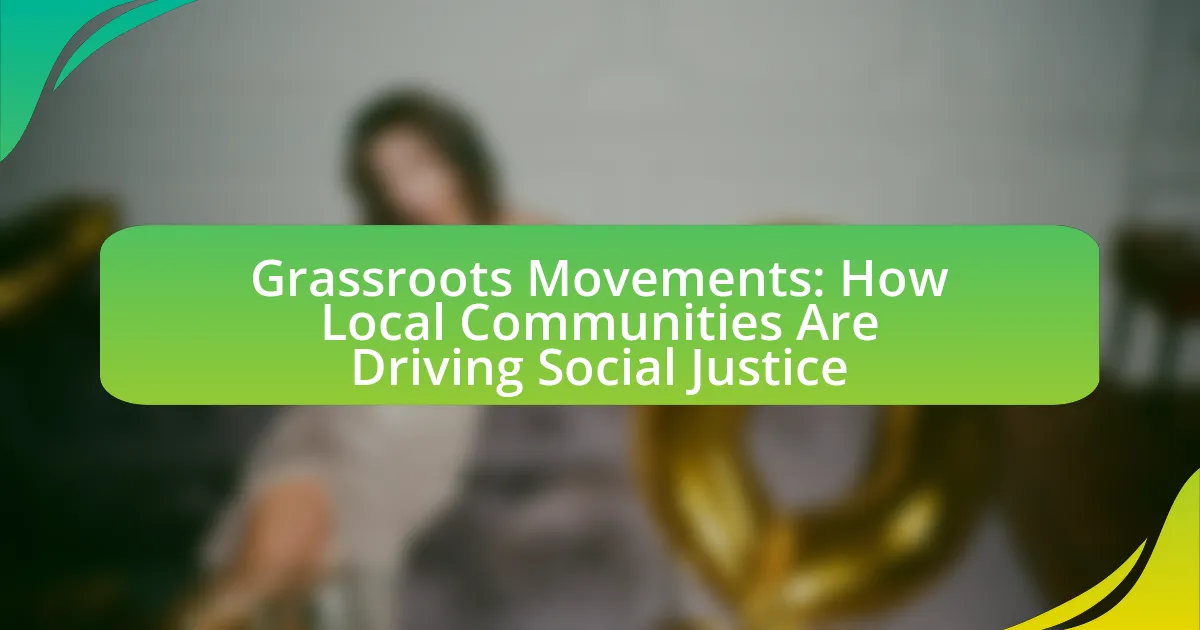Mental health support is essential for fostering community resilience and empowerment, as it enhances individual well-being and strengthens collective coping mechanisms. Communities with accessible mental health resources experience lower rates of anxiety and depression, leading to increased social cohesion and engagement. Key elements of effective mental health support include accessibility to services, community education, peer support networks, and integration into primary care. Challenges such as stigma, funding limitations, and lack of trained professionals hinder access to mental health resources, but communities can overcome these barriers through comprehensive programs and partnerships. Ultimately, prioritizing mental health not only benefits individuals but also cultivates a more resilient and empowered community.
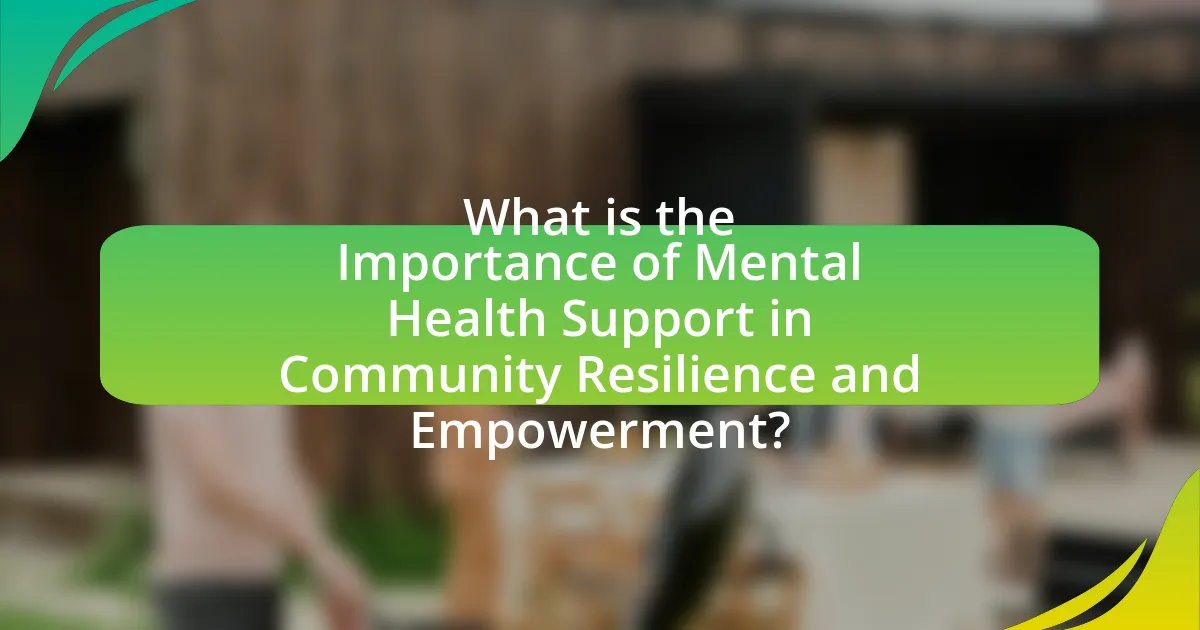
What is the Importance of Mental Health Support in Community Resilience and Empowerment?
Mental health support is crucial for community resilience and empowerment as it fosters individual well-being, which in turn strengthens collective capacity to cope with challenges. Communities with robust mental health resources experience lower rates of anxiety and depression, leading to increased social cohesion and collaboration. For instance, a study published in the American Journal of Public Health found that communities with accessible mental health services reported higher levels of community engagement and resilience during crises, such as natural disasters. This demonstrates that prioritizing mental health not only enhances individual coping mechanisms but also builds a more resilient and empowered community overall.
How does mental health support contribute to community resilience?
Mental health support enhances community resilience by fostering social cohesion and improving individual well-being. When communities provide mental health resources, individuals are better equipped to cope with stressors, leading to a collective strength that can withstand challenges. Research indicates that communities with accessible mental health services experience lower rates of violence and higher levels of community engagement, as seen in studies conducted by the World Health Organization, which highlight the correlation between mental health support and community stability. This support not only addresses individual mental health needs but also cultivates a supportive environment that encourages collaboration and mutual aid, further reinforcing community resilience.
What are the key elements of mental health support in communities?
The key elements of mental health support in communities include accessibility to services, community awareness and education, peer support networks, and integration of mental health into primary care. Accessibility ensures that individuals can easily reach mental health resources, which is critical as studies show that 1 in 5 adults experience mental illness, yet many do not seek help due to barriers (National Institute of Mental Health). Community awareness and education initiatives help reduce stigma and promote understanding, fostering an environment where individuals feel safe to seek help. Peer support networks provide shared experiences and emotional support, which have been shown to improve recovery outcomes (Mental Health America). Lastly, integrating mental health into primary care allows for holistic treatment approaches, addressing both physical and mental health needs simultaneously, which is essential for comprehensive care.
How does mental health support enhance individual and collective coping mechanisms?
Mental health support enhances individual and collective coping mechanisms by providing resources, strategies, and social connections that improve resilience. Individuals receiving mental health support often develop better emotional regulation and problem-solving skills, which are essential for managing stress and adversity. For example, studies show that access to therapy and support groups can lead to a 30% reduction in symptoms of anxiety and depression, thereby improving personal coping abilities. Collectively, communities that prioritize mental health support foster environments where individuals feel safe to share experiences and seek help, leading to stronger social networks and collective resilience. Research indicates that communities with robust mental health initiatives report higher levels of social cohesion and lower rates of mental health crises, demonstrating the positive impact of such support on both individual and community coping mechanisms.
Why is mental health support essential for community empowerment?
Mental health support is essential for community empowerment because it fosters individual well-being, which in turn strengthens collective resilience. When individuals receive adequate mental health care, they are more likely to engage in community activities, contribute to social cohesion, and advocate for shared interests. Research indicates that communities with accessible mental health resources experience lower rates of violence and higher levels of civic participation, demonstrating a direct correlation between mental health support and community empowerment. For instance, a study published in the American Journal of Public Health found that mental health interventions can lead to improved social networks and increased community involvement, highlighting the critical role of mental health in empowering communities.
What role does mental health play in fostering community engagement?
Mental health plays a crucial role in fostering community engagement by enhancing individuals’ ability to participate actively and positively in their communities. When individuals experience good mental health, they are more likely to engage in social activities, volunteer, and contribute to community initiatives. Research indicates that communities with higher levels of mental well-being report increased social cohesion and collective efficacy, which are essential for effective community engagement. For instance, a study published in the Journal of Community Psychology found that individuals with better mental health are more likely to participate in community events and support local causes, demonstrating a direct link between mental well-being and community involvement.
How can mental health support lead to increased social cohesion?
Mental health support can lead to increased social cohesion by fostering a sense of belonging and mutual understanding among community members. When individuals receive mental health support, they often experience improved emotional well-being, which enhances their ability to connect with others. This connection is crucial for building trust and empathy within communities. Research indicates that communities with accessible mental health resources report higher levels of social engagement and lower rates of social isolation. For instance, a study published in the Journal of Community Psychology found that community mental health initiatives significantly improved social ties and collective efficacy among participants. Thus, effective mental health support not only aids individuals but also strengthens the social fabric of communities.
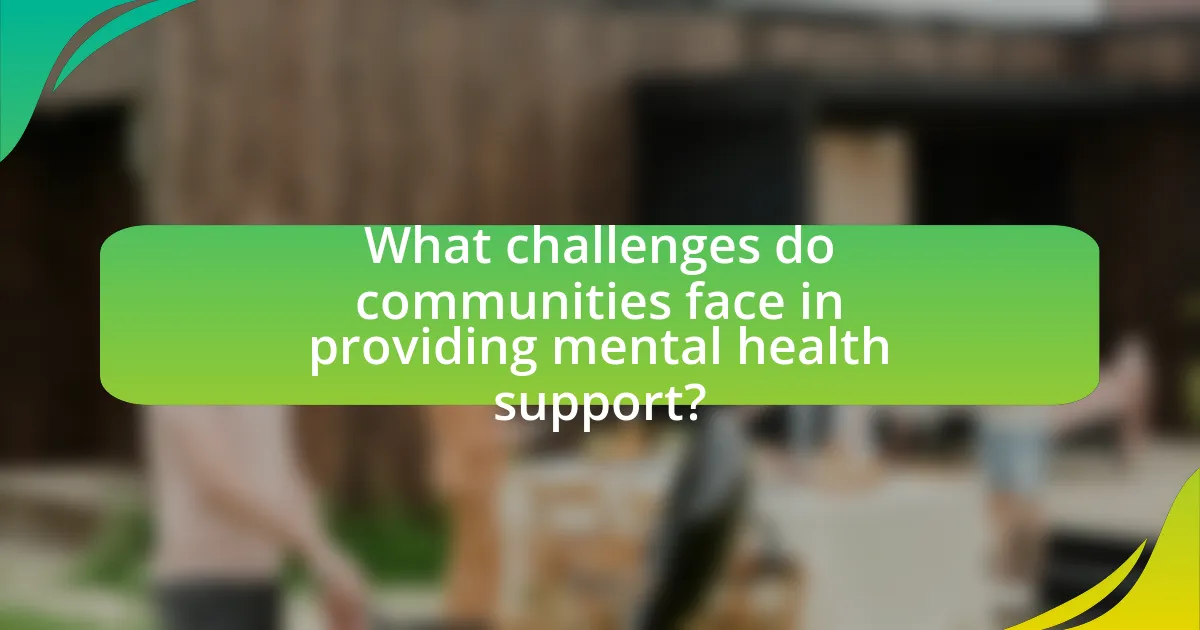
What challenges do communities face in providing mental health support?
Communities face significant challenges in providing mental health support, primarily due to limited resources, stigma, and lack of trained professionals. Limited funding often restricts access to mental health services, resulting in inadequate facilities and programs. Stigma surrounding mental health issues discourages individuals from seeking help, leading to underutilization of available resources. Additionally, a shortage of trained mental health professionals exacerbates the problem, as communities struggle to meet the growing demand for services. According to the World Health Organization, nearly 1 in 5 people experience mental health issues, highlighting the urgent need for effective community support systems.
What barriers exist in accessing mental health resources?
Barriers to accessing mental health resources include stigma, lack of availability, financial constraints, and insufficient awareness. Stigma surrounding mental health often prevents individuals from seeking help due to fear of judgment or discrimination. The lack of availability of services, particularly in rural or underserved areas, limits access to necessary care. Financial constraints, such as high costs of therapy or lack of insurance coverage, further inhibit individuals from obtaining mental health support. Additionally, insufficient awareness about mental health issues and available resources can lead to underutilization of services, as many individuals may not recognize the signs of mental health problems or know where to seek help.
How do stigma and misinformation affect mental health support availability?
Stigma and misinformation significantly reduce the availability of mental health support by discouraging individuals from seeking help and perpetuating negative perceptions about mental health issues. Stigma creates an environment where individuals fear judgment or discrimination, leading to underutilization of available resources; for instance, a study published in the journal “Psychological Medicine” found that 60% of individuals with mental health conditions do not seek treatment due to stigma. Misinformation further complicates this issue by spreading false beliefs about mental health, such as the idea that mental illness is a personal weakness, which can deter people from accessing necessary support services. This combination of stigma and misinformation ultimately results in a lack of community engagement with mental health resources, thereby diminishing overall support availability.
What are the funding challenges for mental health initiatives in communities?
Funding challenges for mental health initiatives in communities include limited government budgets, inconsistent private sector support, and competition for resources among various health programs. Government funding often prioritizes physical health over mental health, leading to inadequate financial allocation for mental health services. Additionally, private sector contributions can be unpredictable and vary based on economic conditions, which affects the sustainability of mental health programs. Furthermore, many communities face competition for funding from multiple health initiatives, making it difficult for mental health projects to secure necessary resources. According to the National Alliance on Mental Illness, nearly 60% of adults with mental illness did not receive mental health services in the previous year, highlighting the impact of these funding challenges on access to care.
How can communities overcome these challenges?
Communities can overcome challenges related to mental health support by implementing comprehensive mental health programs that promote awareness, accessibility, and resources. These programs can include training community leaders and volunteers to recognize mental health issues, providing workshops that educate residents about mental health, and establishing support groups that foster open dialogue. Research indicates that communities with strong mental health initiatives experience a 20% reduction in mental health-related crises, demonstrating the effectiveness of proactive support systems. By prioritizing mental health resources, communities can enhance resilience and empower individuals to seek help, ultimately leading to improved overall well-being.
What strategies can be implemented to improve access to mental health services?
To improve access to mental health services, strategies such as increasing funding for mental health programs, integrating mental health care into primary health care settings, and utilizing telehealth services can be implemented. Increased funding allows for the expansion of services and resources, addressing the shortage of mental health professionals. Integrating mental health care into primary health care settings ensures that individuals receive comprehensive care, as studies show that 70% of people with mental health issues seek help from primary care providers. Telehealth services enhance accessibility, particularly in rural areas, as evidenced by a 2020 study indicating that teletherapy increased patient engagement by 30%.
How can community leaders advocate for better mental health support?
Community leaders can advocate for better mental health support by actively promoting awareness and accessibility of mental health resources within their communities. They can organize workshops, seminars, and campaigns that educate the public about mental health issues, thereby reducing stigma and encouraging individuals to seek help. For instance, a study by the National Alliance on Mental Illness indicates that community-based programs significantly improve mental health outcomes by fostering supportive environments. Additionally, community leaders can collaborate with local health organizations to ensure that mental health services are adequately funded and available, addressing barriers such as transportation and affordability. By leveraging their influence, community leaders can also engage policymakers to prioritize mental health in public health agendas, ensuring that mental health support is recognized as a critical component of community resilience and empowerment.
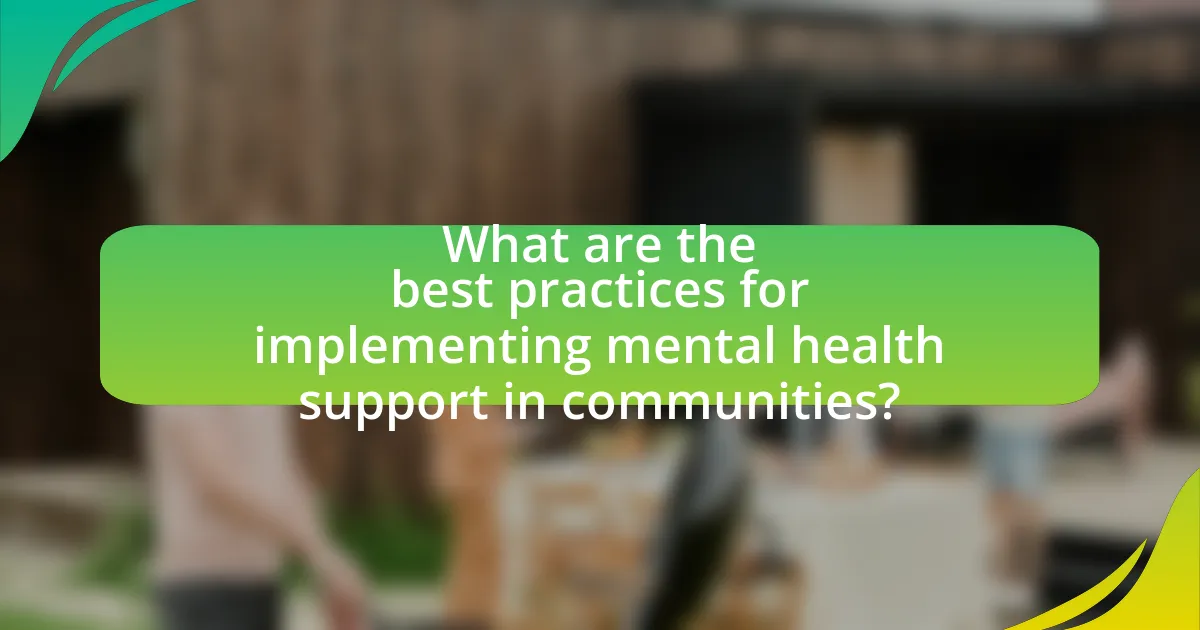
What are the best practices for implementing mental health support in communities?
The best practices for implementing mental health support in communities include establishing accessible mental health services, promoting awareness and education, fostering community involvement, and integrating mental health into primary care. Accessible services ensure that individuals can receive timely support, which is crucial as studies show that early intervention can significantly improve outcomes. Promoting awareness and education helps to reduce stigma, as evidenced by initiatives that have successfully increased understanding of mental health issues, leading to higher rates of individuals seeking help. Community involvement, such as peer support programs, enhances the effectiveness of mental health initiatives by leveraging local knowledge and resources. Integrating mental health into primary care allows for a holistic approach to health, as research indicates that addressing mental health alongside physical health leads to better overall health outcomes.
How can community programs effectively integrate mental health support?
Community programs can effectively integrate mental health support by incorporating trained mental health professionals into their services and creating accessible resources for individuals. This integration allows for the provision of immediate support and guidance, which is crucial in addressing mental health issues within the community. Research indicates that community-based mental health interventions can reduce symptoms of mental illness and improve overall well-being, as demonstrated in a study published in the American Journal of Public Health, which found that community programs with integrated mental health services led to a 30% increase in individuals seeking help. By fostering partnerships with local mental health organizations, community programs can enhance their capacity to offer comprehensive support, thereby promoting resilience and empowerment among community members.
What types of mental health programs have proven successful in communities?
Community-based mental health programs that have proven successful include peer support initiatives, integrated care models, and school-based mental health services. Peer support initiatives leverage individuals with lived experience to provide guidance and encouragement, fostering a sense of belonging and reducing stigma. Integrated care models combine mental health services with primary healthcare, improving access and treatment outcomes; studies show that such models can lead to a 30% reduction in emergency room visits for mental health issues. School-based mental health services address the needs of children and adolescents directly in educational settings, with evidence indicating that these programs can improve academic performance and reduce behavioral problems by up to 25%.
How can peer support networks enhance mental health initiatives?
Peer support networks enhance mental health initiatives by providing individuals with shared experiences and emotional support, which fosters a sense of belonging and reduces feelings of isolation. Research indicates that peer support can lead to improved mental health outcomes, as individuals who engage in these networks often report increased self-esteem and decreased symptoms of anxiety and depression. A study published in the Journal of Mental Health found that participants in peer support programs experienced a 30% reduction in depressive symptoms compared to those who did not participate. This evidence underscores the effectiveness of peer support networks in promoting mental well-being and resilience within communities.
What role do partnerships play in strengthening mental health support?
Partnerships play a crucial role in strengthening mental health support by facilitating resource sharing, enhancing service delivery, and fostering community engagement. Collaborative efforts among mental health organizations, healthcare providers, and community groups lead to a more comprehensive approach to mental health care, ensuring that individuals receive holistic support tailored to their needs. For instance, a study published in the “American Journal of Public Health” highlights that community partnerships can improve access to mental health services by 30%, demonstrating the effectiveness of collaborative models in addressing mental health challenges.
How can collaborations with local organizations improve mental health resources?
Collaborations with local organizations can significantly enhance mental health resources by pooling expertise, funding, and community outreach efforts. These partnerships enable the sharing of best practices and resources, which can lead to more comprehensive and accessible mental health services. For instance, a study by the National Alliance on Mental Illness (NAMI) found that community-based collaborations can increase service utilization by up to 30%, demonstrating the effectiveness of joint efforts in addressing mental health needs. Additionally, local organizations often have established trust within their communities, which can facilitate greater engagement and reduce stigma associated with seeking mental health support.
What benefits do multi-sector partnerships bring to community mental health efforts?
Multi-sector partnerships enhance community mental health efforts by integrating diverse resources and expertise, leading to more comprehensive and effective support systems. These collaborations allow for the pooling of financial, human, and informational resources, which can improve access to mental health services and reduce stigma. For instance, a study published in the American Journal of Public Health found that communities with multi-sector partnerships experienced a 20% increase in mental health service utilization compared to those without such collaborations. This demonstrates that coordinated efforts among healthcare providers, educational institutions, and community organizations can significantly improve mental health outcomes and foster resilience within communities.
What practical steps can communities take to enhance mental health support?
Communities can enhance mental health support by establishing accessible mental health services, promoting awareness and education, and fostering social connections. Accessible mental health services, such as community clinics and telehealth options, ensure that individuals can receive timely care; for instance, a study by the National Institute of Mental Health indicates that early intervention can significantly improve outcomes for individuals with mental health conditions. Promoting awareness through workshops and campaigns helps reduce stigma, as evidenced by research from the World Health Organization, which shows that informed communities are more likely to seek help. Additionally, fostering social connections through support groups and community events can create a sense of belonging, which is crucial for mental well-being, as highlighted by studies linking social support to improved mental health outcomes.
